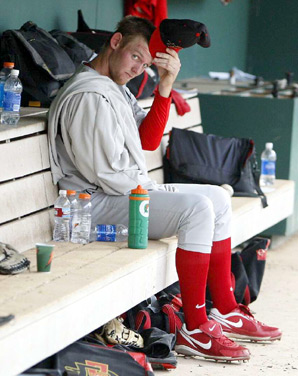Strasburg signing brings a rare feeling of optimism to D.C.
For four-and-a-half months, the Nationals' season on the field has been mostly unwatchable, occasionally embarrassing and entirely forgettable. They have won all of 43 games, which has assured them of another dreary September and another turn at the top of the draft board next June. But Monday night's last-minute signing of Strasburg brought their two biggest victories of the season: a quality young arm who projects as a top-of-the-rotation starter as soon as next season, and one who comes for a relatively reasonable sum that should not constrict their ability to spend money in the offseason.
While that $15 million-plus figure represents a record contract for a draft pick and is still a princely price for a player who has yet to throw a single professional pitch, it's a far cry from the outlandish $50 million tag that had been rumored to be attached to Strasburg. Which means that the Nationals were able to maintain some sense of fiscal responsibility while still securing the services of the player who was considered without a doubt the best amateur player in the country.
Strasburg's numbers from his junior season at San Diego State are indeed eye-catching . A 13-1 record and 1.32 ERA. An astounding 195 strikeouts in just 109 innings. A 100-plus mile-per-hour fastball. Stats like those may make it seem that the Nationals have just secured the rights to the second coming of Randy Johnson. While it's far too soon to put Strasburg in such lofty company, the good news is that for $15 million, he doesn't have to be that good, at least not yet. His contract is sizable but not so massive as to become a prohibitive burden, either on the team's bottom line or on the slender shoulders of the man who signed it. Instead, Strasburg will be judged purely on his ability on the mound and not necessarily as a financial risk who could radically distort the asking prices of future draft picks, or handcuff the Nationals' ability to add other quality talent around him.
That will become especially imperative as the Nationals trudge toward, potentially, the top pick in next year's draft as well. The prize there will be Bryce Harper, a power-hitting high school catcher from Las Vegas whose parents are being advised by Scott Boras, the superagent who represents Strasburg. Having established a new record with Strasburg, it's likely that whoever represents Harper next year will seek an even greater contract. But rather than trying to eclipse a $50-million deal, the benchmark will be a comparatively reasonable $15 million. The question now becomes when to bring Strasburg to Washington. Tony Gwynn, his college coach, predicted he would not need a long apprenticeship in the minor leagues, and both Nats acting general manager Mike Rizzo and scouting director Dana Brown had shown great interest in Strasburg before the draft precisely because he was, in their words, a "quick to the big leagues guy." How quick that is remains to be seen. There is unquestionably a need for quality starting pitching in Washington. The Nationals rank last in the majors among starting pitchers in both wins (26) and strikeouts (372) and last in the National League in runs allowed and next-to-last in innings pitched.
But Strasburg won't offer much in the way of short-term gain. With or without him, the Nationals are going nowhere this year, and besides, there may not be enough time to get Strasburg ready to face major league hitters by September. Even if Strasburg were to be assigned to a minor league team, that season will be over by September 1, and since he hasn't thrown a pitch in game action since San Diego State was eliminated from the NCAA Tournament back in May, it makes little sense to rush such a valuable commodity along when the only thing they would get in return is some increased ticket sales.
What's more, pitching at the major league level so soon would not offer much of a barometer for predicting his future performance. Only two pitchers to go No. 1, David Clyde and Ben McDonald, debuted the same year they were drafted. Clyde was just 18 when he struck out eight in five innings to win his first game for the Rangers in 1973, but went just 4-8 that year and was out of the majors by 1979. McDonald was 21 and had been a college star at LSU when he was promoted to the majors as a September call-up in 1989. Pitching in relief, he posted an 8.59 ERA and never did fulfill his promise, retiring after the 1997 season with a 78-70 record and 3.91 ERA. Not surprisingly, neither pitcher demonstrated that he was ready for the majors at such a young age.
Given the alarming amount of hype that has followed him all year long, Strasburg will not be able to just be another faceless late-season roster addition. If he's bad, it could be an unnecessary setback in his confidence; if he's good, it could give both pitcher and team an untenable desire to accelerate his development.
The Nationals waited through four-and-a-half dreary seasons to draft a player like Strasburg and two-and-a-half more months to sign him. What's another few months to make sure that once he arrives, he's there to stay? After all, the signing of Strasburg isn't about what he can do for the Nationals in 2009, but about what he can do for them in the years to come.





